The Intel 9th Gen Review: Core i9-9900K, Core i7-9700K and Core i5-9600K Tested
by Ian Cutress on October 19, 2018 9:00 AM EST- Posted in
- CPUs
- Intel
- Coffee Lake
- 14++
- Core 9th Gen
- Core-S
- i9-9900K
- i7-9700K
- i5-9600K
CPU Performance: Office Tests
The Office test suite is designed to focus around more industry standard tests that focus on office workflows, system meetings, some synthetics, but we also bundle compiler performance in with this section. For users that have to evaluate hardware in general, these are usually the benchmarks that most consider.
All of our benchmark results can also be found in our benchmark engine, Bench.
PCMark 10: Industry Standard System Profiler
Futuremark, now known as UL, has developed benchmarks that have become industry standards for around two decades. The latest complete system test suite is PCMark 10, upgrading over PCMark 8 with updated tests and more OpenCL invested into use cases such as video streaming.
PCMark splits its scores into about 14 different areas, including application startup, web, spreadsheets, photo editing, rendering, video conferencing, and physics. We post all of these numbers in our benchmark database, Bench, however the key metric for the review is the overall score.
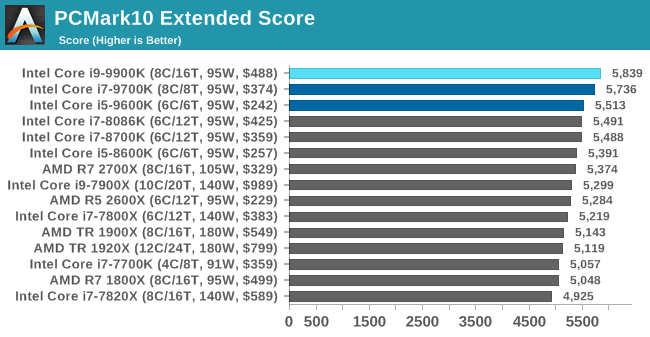
As a general mix of a lot of tests, the new processors from Intel take the top three spots, in order. Even the i5-9600K goes ahead of the i7-8086K.
Chromium Compile: Windows VC++ Compile of Chrome 56
A large number of AnandTech readers are software engineers, looking at how the hardware they use performs. While compiling a Linux kernel is ‘standard’ for the reviewers who often compile, our test is a little more varied – we are using the windows instructions to compile Chrome, specifically a Chrome 56 build from March 2017, as that was when we built the test. Google quite handily gives instructions on how to compile with Windows, along with a 400k file download for the repo.
In our test, using Google’s instructions, we use the MSVC compiler and ninja developer tools to manage the compile. As you may expect, the benchmark is variably threaded, with a mix of DRAM requirements that benefit from faster caches. Data procured in our test is the time taken for the compile, which we convert into compiles per day.
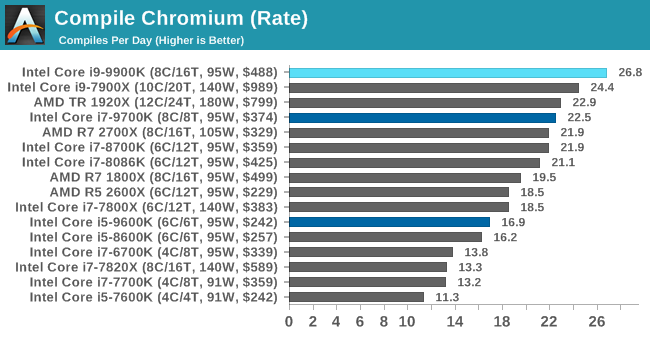
Pushing the raw frequency of the all-core turbo seems to work well in our compile test.
3DMark Physics: In-Game Physics Compute
Alongside PCMark is 3DMark, Futuremark’s (UL’s) gaming test suite. Each gaming tests consists of one or two GPU heavy scenes, along with a physics test that is indicative of when the test was written and the platform it is aimed at. The main overriding tests, in order of complexity, are Ice Storm, Cloud Gate, Sky Diver, Fire Strike, and Time Spy.
Some of the subtests offer variants, such as Ice Storm Unlimited, which is aimed at mobile platforms with an off-screen rendering, or Fire Strike Ultra which is aimed at high-end 4K systems with lots of the added features turned on. Time Spy also currently has an AVX-512 mode (which we may be using in the future).
For our tests, we report in Bench the results from every physics test, but for the sake of the review we keep it to the most demanding of each scene: Ice Storm Unlimited, Cloud Gate, Sky Diver, Fire Strike Ultra, and Time Spy.
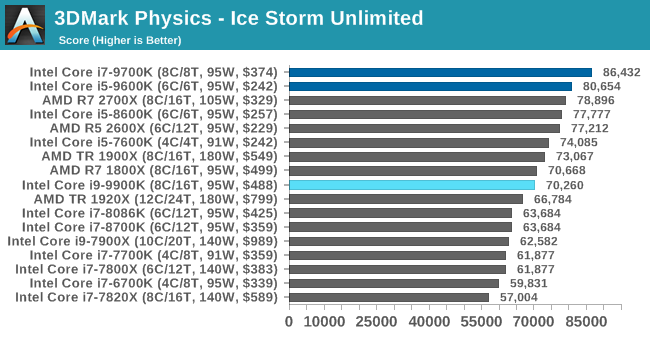
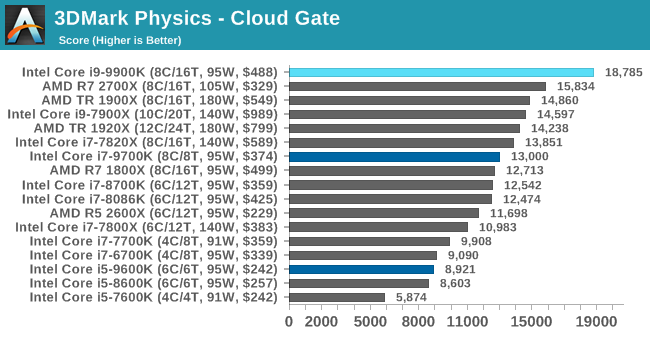
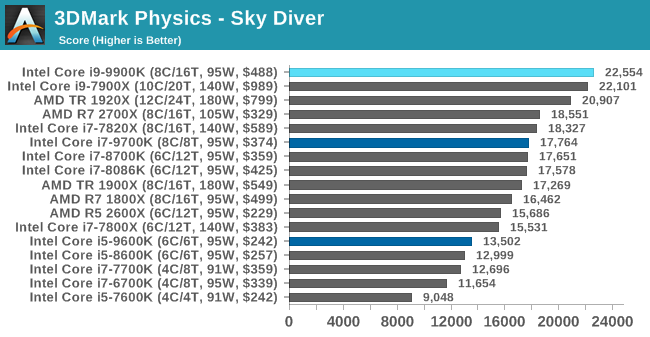
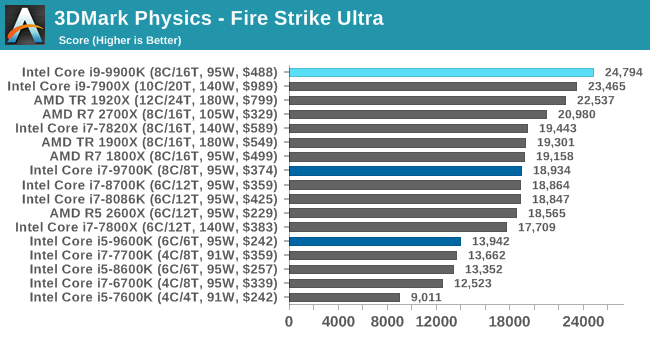
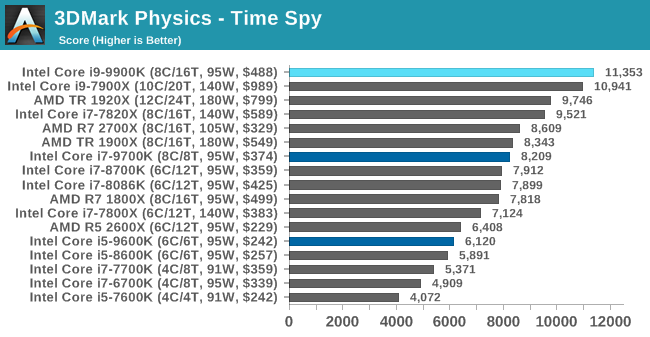
The older Ice Storm test didn't much like the Core i9-9900K, pushing it back behind the R7 1800X. For the more modern tests focused on PCs, the 9900K wins out. The lack of HT is hurting the other two parts.
GeekBench4: Synthetics
A common tool for cross-platform testing between mobile, PC, and Mac, GeekBench 4 is an ultimate exercise in synthetic testing across a range of algorithms looking for peak throughput. Tests include encryption, compression, fast Fourier transform, memory operations, n-body physics, matrix operations, histogram manipulation, and HTML parsing.
I’m including this test due to popular demand, although the results do come across as overly synthetic, and a lot of users often put a lot of weight behind the test due to the fact that it is compiled across different platforms (although with different compilers).
We record the main subtest scores (Crypto, Integer, Floating Point, Memory) in our benchmark database, but for the review we post the overall single and multi-threaded results.
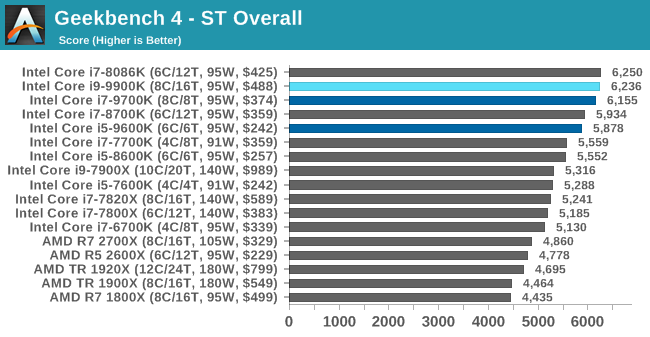
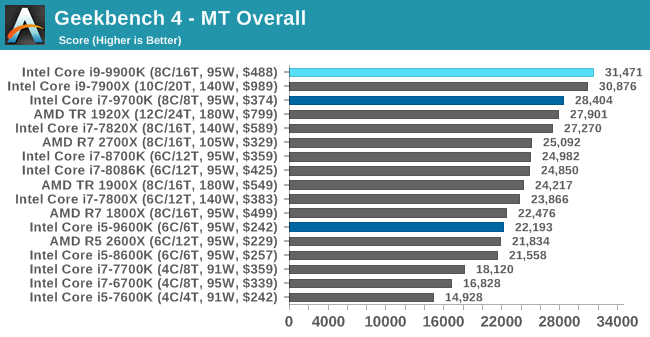










274 Comments
View All Comments
Hxx - Friday, October 19, 2018 - link
i came in here to see how my now mid range 8700k OC at 5GHZ stacks against the 9900k. It holds its own but my the 9900k is impressive. the 9700k hits 5.4ghz im hoping on a custom loop the 9900k/9700k to hit 5.5ghz without too much fuss.Alistair - Saturday, October 20, 2018 - link
You taking that on faith? Way too much heat to cross 5.2ghz.mapesdhs - Sunday, October 21, 2018 - link
5.5 without too much fuss? I guess he hasn't watched der8auer's updates on the 9900K. :Dedwpang - Friday, October 19, 2018 - link
This i9 9900k makes me remember the Prescott which is very hot and power consuming.GNUminex_l_cowsay - Friday, October 19, 2018 - link
What does "IGP" mean? If it means low enough to run on the integrated graphics then include the actual integrated graphics performance.Why are AMD cpus missing from half the gaming benchmarks. If you don't have enough time to test all the cpus then cut out the redundant components like 6700k or 7700k, or get rid of the stuff no one bought like the 8086k.
IndianaKrom - Friday, October 19, 2018 - link
Well, now we know why they soldered the chip to the heat spreader: Passing 220w through ~177 mm2 of thermal paste is an exercise in futility. Without a doubt, those all core turbo frequencies are impossible to sustain for more than a fraction of a second without either liquid metal or solder as the transfer compound. Its probably even worse than that because the power and heat isn't going to be spread evenly over the entire die, so it may be exceeding 2-3w/mm2 in places. It would be a whole different type of "Meltdown" flaw if they were still using paste with that kind of power density.mapesdhs - Sunday, October 21, 2018 - link
See:https://www.youtube.com/watch?v=r5Doo-zgyQs
nowayout99 - Friday, October 19, 2018 - link
On a scale of 1-10, I give the 9900K a 14+++++.ToTTenTranz - Friday, October 19, 2018 - link
There's some dedication to "value" in the article, yet all the graphs only show the launch MSRP for each CPU. The TR 1920X costs around $400 right now, about half of the price that appears in the graph.Also, those 2700X scores on Ashes look strange. Slower than the 2600X in a game that tends to like more cores? Something's missing..
isabirov - Friday, October 19, 2018 - link
Why power consumption of 8700k and 8086k differs so much? Shouldn't 8086k be higher than 8700k?